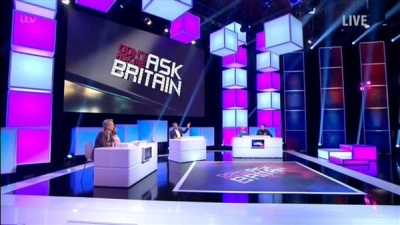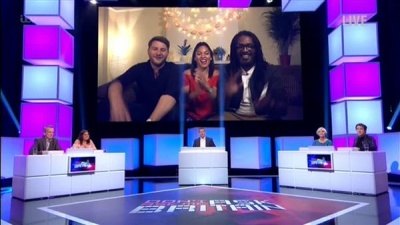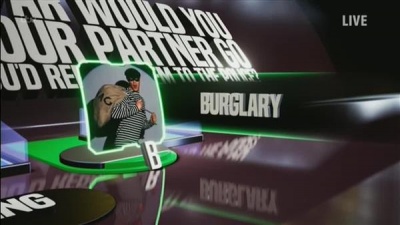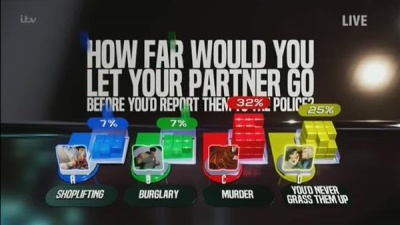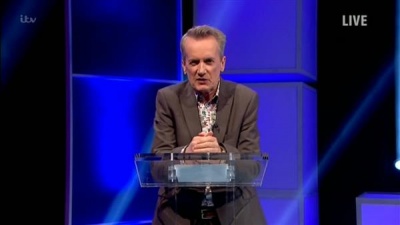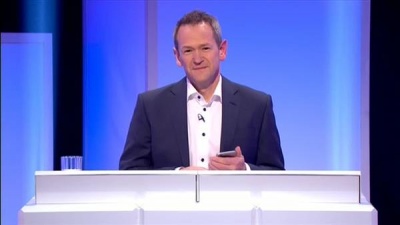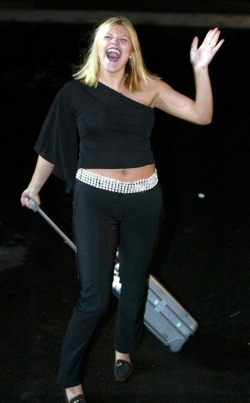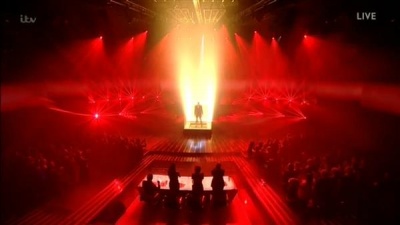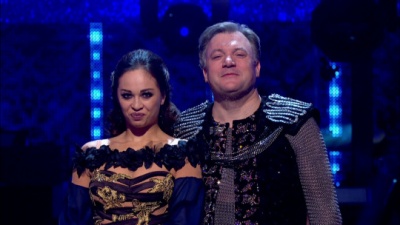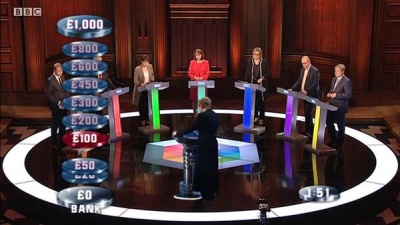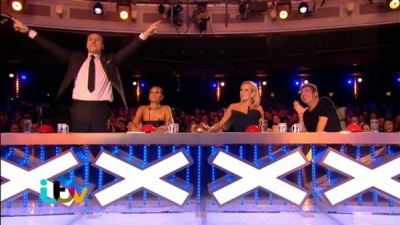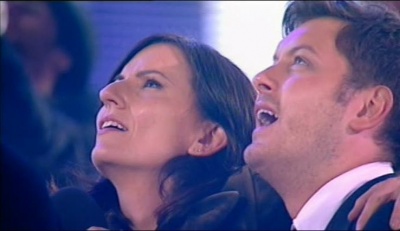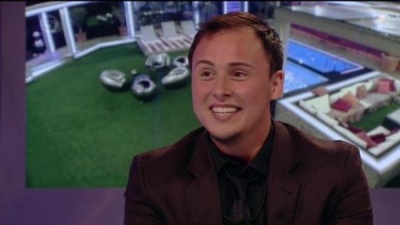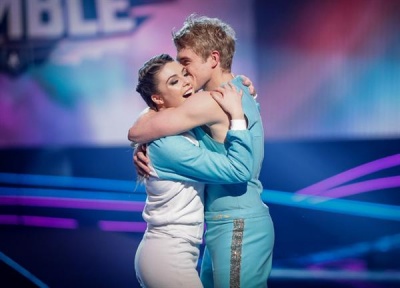Weaver's Week 2017-06-04
Last week | Weaver's Week Index | Next week
A self-selecting electorate answers trivial questions about society. A studio panel predicts how the vote will go, has their predictions refuted within moments, eats hats, and tries to make sense of the randomness. Welcome to Election Night.
Later, we ask what effect reality shows have had on the partisan political process. First, a show that asks us to vote early and vote often.
Contents |
Don't Ask Me, Ask The Viewing Audience
Chalkboard for ITV, 18 April – 23 May
Alexander Armstrong is at the election desk. He's aided by a team behind the scenes, some very fancy graphics and computer-linked laser display boards. Blocks will fall, lasers will fire, lights will flash, and results will – er – result.
Xander is joined by a panel of guests. In fact, he's joined by two panels. The Moss Collectors' Society is headed by Jonathan Ross; The Boinging Baggies is led by Frank Skinner.
Jonathan Ross and Frank Skinner are the spine of the show. Taken with the host, it can get very white and middle-class and middle-aged. That's an audience ITV is comfortable with, and that's a panel ITV will get criticised about. To increase diversity, they've invited two guest women, one of them black or Asian. (Yes, on one show Adil Ray turned up, and he's a he.)
Further diversity came from The Voice of the People, a live webcam from a sofa somewhere in ITVland. Three selected viewers – different generations, all ITV viewers – could contribute to the discussion. They weren't in the studio, had to be cued in by Xander, and their contributions always felt clunky. This part of the show vanished after episode four, and it wasn't much missed.
Voting is done in the modern style: by a bespoke "application" on certain hand-held computer devices. Like the applications for The X Factor and This Territory's Got Talent, ITV gets some demographic data about the viewers to this programme. They can take this information and say to advertisers, "this show had lots of BC1C2 35-54s in the south-west".
The format of the show is simple. Xander asks a question, such as "How far would you let your partner go before reporting them to the police?" He also offers some possible answers. "You'd turn them in if you found them shoplifting? Burglary? Committing murder in cold blood? You'd never turn them in?" All of this is displayed by some whizz-bang flashy animated graphics.
Xander declares the vote open, and he also opens the discussion in the studio. Jonathan and Frank give their pieces. We're sure the talent has been tipped off about the questions, and has had time to think about what they'll say. This preparation makes a better programme, the discussion flows well, and we get some interesting anecdotes from the guests.
During the chat, the vote quietly closes. Each Active Voting Window lasts for about two minutes. While the votes are being counted, the teams are asked for a prediction of the result. Points are awarded based on how many of the viewing public gave the same answer as that panel.
And repeat, and repeat, and repeat. We'll get through a new topic every few minutes, so if this topic isn't of interest, there might be something more fun coming after the break.
But an hour of this would get tedious. To inject some sort of variety, part three is the "Who's with me?" round. In turn, Frank and Jonathan will step up to a podium and advocate a particular idea. For instance, we might hear a one-minute lecture entitled "Speed lanes should be introduced for pedestrians". Frank might advocate this idea, then the rest of the panel – and the sofa – critique it and pull it apart. Points for the percentage of votes that do agree with the idea.
Vote early, and turn over often
Back in the past, Don't Ask Me Ask The Viewing Audience was piloted as a big money quiz for the public. We can see why they changed it, the voting public has a nasty habit of voting to undermine the players they dislike. There could be some painful compliance problems, neatly avoided now the show is for entertainment. But the celebrity gabfest just drones on and on, there's little variety and not enough entertainment.
There's no reason for the viewers to vote honestly. Indeed, there's no reason for an individual viewer to vote at all – none of them are going to be namechecked on air. This is a missed opportunity, they could build viewer loyalty with such ease. Xander might close the show with something like:
"On tonight's show, we learned that you'd let your partner get away with murder, you like your eggs fried, and speed lanes should be introduced for pedestrians. In short, we all agree with MoonFlower95 from Nottingham. Good night!"
Because the series coincided with an election for the Westminster parliament, there was to be no discussion of partisan politics, and no discussion of questions that might reasonably be seen as partisan. "Should there be a second independence referendum vote?" Not going to happen. "What's the biggest problem in the world?" Er, no thanks. Not that the show entirely avoided difficult topics. "Should there be a limit on the number of children people can have?" Not on any of the party manifestos, so a topic they can ask – and did ask.
We found the topics to be tame. At 8pm, there are many restrictions: can't ask about sex, can't use bad language, now they can't talk politics. All of these restrictions are courtesy of the thought police at OFCOM, but there are more fundamental flaws.
Don't Ask Me Ask the Viewing Audience drags on too long: it's not a one-hour show. They could easily lose one of the segments, and put the programme out in the Saturday slot after The X Factor auditions. And they could allow viewers to fully express their vote: the "how far would you let the partner go?" question worked well because it is on some sort of scale. A question such as "how do you like your eggs?" might take many answers, or ranking the choices.
Viewers agreed: the show started with overnight ratings of 1.75m viewers, and fell to around 1.3m by the end of the series. Because it's a live show, there's no reason to watch on ITV+1 or other catchup. By comparison, Bake Off Crème de la Crème got over 2m overnights, and gained another half-million from catch-up.
We were bored by this show: no pace, little atmosphere, dull topics. It's clear that Don't Ask Me was a work-in-progress, there were changes and tweaks as the series progressed. We wouldn't mind a short second series in the autumn, once the election's finished. (Please let the election be finished.)
What have we learned from reality show voting?
Back in April, we stumbled across these thoughts.
- "H": Aughts reality tv was a massive red flag warning us not to let people vote for things – but did we listen?
- "Arn": Democracy never works. It just 'doesn't work' better than any other system. Insofar as you can predict public voting tendencies, reality show votes tell you a lot about voting patterns.
And we got thinking. What are the tricks of reality telly democracy?
For this article, we're thinking only about shows where the viewers vote for the winner; in particular, we don't consider The Apprentice. Been there, covered that.
This column's initial position is that society influences reality shows much more than reality shows influence society. Society is big, reality shows tend to be small. That said, broadcast television is the main cultural force at this time, and sufficiently popular programmes – or well-regarded programmes – can cut through to influence people. For this reason, we're concentrating only on mainstream shows: niche programmes have no hope of cutting back to influence society.
Reality shows have a wide choice – there is something for everyone. When it's done well, Big Brother is deliberately cast to be a microcosm of society. The X Factor has a range of singing styles, from pop to quirky. Got Talent is, literally, a variety show.
We make provisional votes, subject to change next week. We can make a choice today based on what we've seen, with the option to change our view next week. A runaway loser, such as Jade Goody, can turn into a solid winner, such as Jade Goody.
A wide variety of political groups stand for election, all the way from The Roman Party (Ave!) to Future First. While votes are never final, it can be very difficult to alter your vote, and other stuff happens while we wait to cast the next one. For instance, one policy would restrict the number of foreign students at leading universities.
Reality shows have pressure from the producers – sometimes subtle, sometimes blatant. If the edit didn't make Dean look dull, then Dermot on BBLB would ram home the preferred message. The X Factor is a master of this, ramping up the producers' favourites and using psychological tricks to ramp down unwanted acts. Seen any red-and-black staging, or fire? The producers want to lose this act.
For the producers, it's about ratings and ad revenue. To that extent, reality shows are trojan horses, they use other people's abilities as a means of marketing themselves.
A corollary: they will keep the entertaining rubbish for as long as they're useful. Remember last year, when there were inept but fun performances on both talent shows? Ed Balls and Honey G were both kept to late November, then allowed to leave.
Disposable stars – every new series requires a new cast, who can't be compared with last year's lot. Big Brother producers ban discussion of last year's series. Got Talent clips up and repackages memories that make it look good. After a time, it all melds into a mushness. Who won The X Factor in 2012? Who came second? Who won Love Island last year?
Traditionally, the world of party politics has changed much more slowly. After the 2010 debates, one contender was voted off, and the other two survived to the next round in 2015. But only two of the seven returned to Salford last month, and we'd be surprised if there's a similar return next time.
Reality television encourages competition, and some argue this reflects the neoliberal ideology. Society promotes a dog-eat-dog attitude, survival of the most popular. What would a paternalist reality contest look like? Might well be CBBC's Got What It Takes?, where mothers and children work together, and no-one is eliminated until the final.
Reality shows engage young people, by giving something to aspire to. Anyone can turn up on Big Brother, no matter how dull, how quotidian. Even Scott. Anyone can turn up and audition for Fame Academy, even Alex. We see people we can hang with, who share our fears and dreams. People we can spend time with, people we might fantasise about dating.
That's a big difference from party politics. From this campaign, we've heard a lot of negativity and pessimism. We've heard a lot about other people's dreams, and they leave us fearful. There's no uplift, no positive reason to go out and vote. At times, it feels like engaging with this lot will only encourage them, and they're not people we want to hang out with.
A generation of voters has grown up with these tropes, with this way of doing things. Heck, some of the voters at the recent local elections were born after Big Brother began. But the political classes have ignored them.
Whether it's television, radio, print, the news media all ask simple questions. They want ratings, eyeballs, advertising impressions. Just like The X Factor producers, media producers know that controversy and shouting gets a quick fix, it's a sugar rush for the ratings.
Think about The Voice for a moment. On stage, Terri is singing her song. The camera pulls back to four people listening – and listening intently. Paloma, Tom, Danny, will.i.am all listen, think, and judge on what they're hearing. They're concentrating, they judge on performance and not on looks.
Then think about the daily tabloids. Hur hur, he smells. Hur hur, she's rotten. These organs do not listen, they do not think, they just reach for a prescribed judgement. They're judging on appearance and prejudice, not on actual performance.
Why do the press give more sensible coverage to The X Factor than they do to a Westminster election? Which matters more? The message we're getting from the press is that The X Factor is gravely important, and Wesminster is disposable fluff.
Indeed, we can see many of the other tropes from talent shows in news coverage. Simon Cowell passing judgement on a singer? Compare to Robert Peston giving "analysis" of a speech or a policy. Interference from the producers? See any newspaper front page, ever. The complete incompetent who is only there for entertainment? Yes, Jeremy Paxman is still interrupting.
Finding out whether a politician is truly competent is an effortful and time-demanding task. Deciding whether a politician looks competent is an extremely easy task. The mass media takes the easy option, they deal in looks and not in competence. They're after style and gloss, not substance. Democracy is being infantilised, viewers aren't allowed to think for ourselves.
Back to reality shows, where we find honesty wins. Gameplayers lose, cynics never prosper. Nick Bateman failed. Jay McCray failed. Susan Boyle did not win her series. The winners come from participants who are the most genuine, who don't overtly play the game. Just by being human and honest, the winners make a connection with the viewer.
Who are the winners from this campaign? Like him or loathe him, Jeremy Corbyn has done well, because he is honest. Corbyn is human, he is fallible, he's done some strange things and isn't scared to change his views. Caroline Lucas has done well, because she makes being honest look effortless. Lucas doesn't leave us thinking "what trick is she pulling", she comes across as sincere - and we don't have the nagging doubt of "is she being advised" like we got from Jade Goody.
Research in 2005 (2005! 8 Out of 10 Cats had still to be invented!) showed that regular viewers of Big Brother were just as likely to vote in general elections as anyone else. They believe that an electoral system modelled on this detailed exposure would give a better insight into political choices than traditional campaigns.
So why hasn't this happened? Why hasn't Channel 5 taken half-a-dozen wannabe politicos, thrown them into the Big Brother studio, and filmed what happens? Instead, we understand that tomorrow's series begins with Random Candidate #27 asking us to vote them in.
Reality television forces viewers to think about people as people, not as labels. We have to engage with the characters, take the bits we dislike and the bits we agree with. We need to weigh up everyone's good bits and worst bits. Brian Dowling is lovely, the life of the party, but he can be so full of the drama.
Media coverage reduces complex politicians to soundbites. The media reduce complex policies to a single headline. Reality contests encourage compromise. Reality shows ask us what our key values are, and who best represents them.
Has voting in reality telly influenced voting at the ballot box? Not yet, but we've no doubt it will do.
And there is one area where reality shows have influenced party politics: using t'internet as a tool to bring fans together. Remember the 2003 series of Fame Academy, and how the producers tried to ignore Alistair Griffin's massive talent? His fans were not pleased, and bombarded the BBC with emails and clogged up web boards. Since then, other communications channels have emerged. Jedward have a wild bunch of fans, Big Brother gets spooked every summer by protesters, and now literally weighs people's votes.
A similar effect can be observed in partisan politics – massive pile-ons began with the 2014 referendum vote on independence for Scotland, and have continued ever since. We consumers, the people formerly known as the audience, know that we're being manipulated. Some have chosen to counter the bias in mainstream media with fringe media – equally biassed, but in a different direction. This column prefers to treat all the mainstream media with a large degree of scepticism.
Have a good election. If you will vote, may it be with wisdom and consideration, a decision you can live with for the next five years.
And if you can't have a good election, Bake Off is on the I-player in a few minutes, make yourself a brew.
This Week and Next
Best of the Web: Buzzerblog talked to Alex Horne about Taskmaster.
A few weeks ago, we noted how "BBC Studios" was both a production company and a set of workspaces in Shepherd's Bush. Now, we hear that ITV is going to move there when their own studios close late this year. The authority announcement at 6am is going to be long. "Live from BBC Studioworks' BBC Studios in London, this is ITV Breakfast Broadcasting. Good Morning Viewers, with Susannah Read and Piers Click-over-to-the-other-side!"
In the TV Guide, we asked for valid Countdown words formed from SWINGOMETER. We found about two dozen eight-letter words, and two nine-letter words: "Regiments" and "Westering". Well done if you got those at home.
The X Factor in 2012 was won by notorious homophobe James Arthur, ahead of Jahméne Douglas. Love Island was won last year by Nathan Massey and Cara De La Hoyde.
BARB ratings in the week to 21 May.
- This Territory's Got Talent (ITV, Sat) remains the top show, seen by 10.65m. Drama Three Girls (BBC1, Tue) was the next biggest draw, 8.25m.
- Have I Got News for You (BBC1, Fri) and Pointless Celebrities (BBC1, Sat) tie for second, on 4.65m. Take Me Out (ITV, Sat) pulled 3.35m.
- BBC2's biggies include Bake Off Crème de la Crème (Tue, 2.5m) and Great Local Menu (Tue, 2.1m). Over on ITV, Tipping Point (Mon) makes a rare top thirty appearance – 2m is enough while The Chase is away.
- Celebrity Juice (ITV2, Thu) leads the multi-channel games on 1.11m viewers. Taskmaster (Dave, Tue) scooped 830,000, ahead of More Talent (ITV2, Sat, 825,000). On Channel 4, The Fake News Show brought 770,000.
- A new run of Go 8 Bit (Dave, Mon) began with 380,000. There's a year high for The Chase on Challenge (260,000, Fri).
The final of This Territory's Got Talent (ITV and TV3, Sat) went out last night. It moved to avoid a clash with a charity concert in Manchester, arranged at very short notice.
With the calendar hitting June, we have new series of Big Brother (C5) and Love Island (ITV2), both from Mon. 8 Out of 10 Cats Does Countdown (C4) and Mock the Week (BBC2) have election specials on Thursday. And it's the first edition of BBC The Voice Kids (ITV, Sat): Emma and will.i.am are joined by Danny Jones and Pixie Lott.
Photo credits: Chalkboard, Syco/Thames, BBC, Endemol.
To have Weaver's Week emailed to you on publication day, receive our exclusive TV roundup of the game shows in the week ahead, and chat to other ukgameshows.com readers, sign up to our Yahoo! Group.


